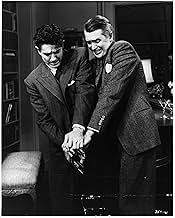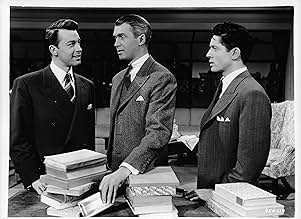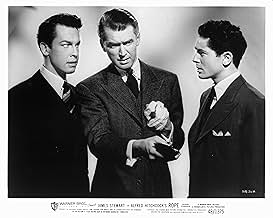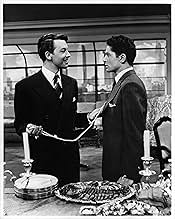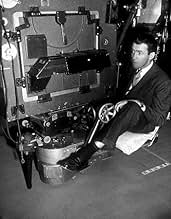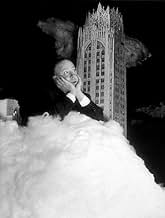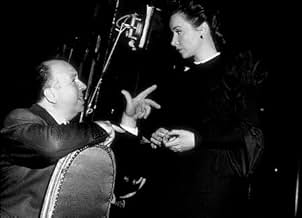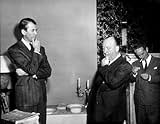Dos hombres que asesinaron a un ex compañero de clase organizan una cena social para probar que han cometido el crimen perfecto.Dos hombres que asesinaron a un ex compañero de clase organizan una cena social para probar que han cometido el crimen perfecto.Dos hombres que asesinaron a un ex compañero de clase organizan una cena social para probar que han cometido el crimen perfecto.
- Dirección
- Guionistas
- Elenco
- Premios
- 4 premios ganados y 3 nominaciones en total
Cedric Hardwicke
- Mr. Kentley
- (as Sir Cedric Hardwicke)
Peggy Robertson
- Woman Walking on Sidewalk
- (sin créditos)
Opiniones destacadas
This 1948 Hitchcock film is mostly noted for its technical achievements. Hitchcock filmed this story, about two well-to-do rich kids who decide to commit a murder for the fun of it, as a play. Which, it in fact, originally was, though based in London and not New York. Technical limitations did not enable his original vision of making the entire picture one continuous long shot. Instead it is made up of several 8 minute continuous shots. This was the length of film that fit into one reel. Using some very inventive cutting techniques the film appears as if it was filmed all in one take. This is more impressive when you see the actual size that color film cameras were during this time period. They were absolutely enormous, bigger than a man standing. To move the camera in and around the small stage space, many of the set pieces were set on casters and rolled about to keep out of the way of the camera. Some of the actors were noted in saying that they worried every time they sat down, that there might not be a chair for them to fall into. Another achievement of the film is in terms of lighting. The apartment that the entire film is set in has several large windows overlooking the city. As the movie is more or less uninterrupted from start to finish we see the lighting change as the sun begins to set and night falls. It is a testament to this achievement that upon first viewing you don't really notice the effect. Yet, the filmmakers took great pains to get it to look realistic, staging numerous re-shoots for the final few scenes.
Though the technical achievements are quite wonderful, it is a shame that they have overshadowed what it really a very good bit of suspense. It seems the two high society murderers have planned a dinner party just after the murder. They store the corpse in a wood box that is featured prominently in the midst of the dinner. This creates an excellent mix of suspense and the macabre. Throughout the party the murderers become more unraveled even as they are enjoying their little game.
All of the acting is quite good. The two murderer (John Dall and Farley Granger) do a fine job of playing intellectual, society playboys, with a desire for excitement. It is slightly annoying watching their excited, nervous mannerisms (especially some stuttering by Jon Dall) but it is fitting with the characters. Their former instructor, Rupert Cadell, is played magnificently by the impeccable James Stewart. This is a bit of departure from Stewarts typical roles. Here he is a tough, cynical intellectual. This was his first of four collaborations between Stewart and Hitchock and it is hard to imagine his role as Scottie in Vertigo without having first played in this movie.
The story unravels in typical Hitchock fashion. The suspense is built, then lessoned by some well timed comedy, and then built again to a final crescendo. Hitchcock was excellent as a technical director and allowed his actors the breathing room they needed for fine performances. In the end I left the picture feeling more excited about the superb storytelling than any particular technical achievement. It is a testament to his craft, that Hitchock allows you to leave a picture being enamored with his story over his technical achievements. Some of the greatest effects are those you don't notice because they seem so natural and real.
Alfred Hitchock manages a triumph of technical brilliance and suspense in Rope. It's influence in the technical realm of cinema far outshines any effect the story has on future movies. This is a shame, for the story being told is one of suspense, macabre and excitement.
Like this review? Go to www.midnitcafe.blogspot for more.
Though the technical achievements are quite wonderful, it is a shame that they have overshadowed what it really a very good bit of suspense. It seems the two high society murderers have planned a dinner party just after the murder. They store the corpse in a wood box that is featured prominently in the midst of the dinner. This creates an excellent mix of suspense and the macabre. Throughout the party the murderers become more unraveled even as they are enjoying their little game.
All of the acting is quite good. The two murderer (John Dall and Farley Granger) do a fine job of playing intellectual, society playboys, with a desire for excitement. It is slightly annoying watching their excited, nervous mannerisms (especially some stuttering by Jon Dall) but it is fitting with the characters. Their former instructor, Rupert Cadell, is played magnificently by the impeccable James Stewart. This is a bit of departure from Stewarts typical roles. Here he is a tough, cynical intellectual. This was his first of four collaborations between Stewart and Hitchock and it is hard to imagine his role as Scottie in Vertigo without having first played in this movie.
The story unravels in typical Hitchock fashion. The suspense is built, then lessoned by some well timed comedy, and then built again to a final crescendo. Hitchcock was excellent as a technical director and allowed his actors the breathing room they needed for fine performances. In the end I left the picture feeling more excited about the superb storytelling than any particular technical achievement. It is a testament to his craft, that Hitchock allows you to leave a picture being enamored with his story over his technical achievements. Some of the greatest effects are those you don't notice because they seem so natural and real.
Alfred Hitchock manages a triumph of technical brilliance and suspense in Rope. It's influence in the technical realm of cinema far outshines any effect the story has on future movies. This is a shame, for the story being told is one of suspense, macabre and excitement.
Like this review? Go to www.midnitcafe.blogspot for more.
Rope is one of the finer films that Hitchcock made. Philosophy, sociology and psychology are contained in equal parts. The plot is simple, the characters are complex and Hitchcock's treatment of the Leopold and Loeb parallel quite deft. The final soliloquy from Jimmy Stewart's character, Rupert, is not only one of the finest examples of Stewart's acting abilities but also of film-making.
On the subject of filmmaking - Hitchcock filmed this in as much of a single take as possible. I believe there are only five edits in the whole thing. I can wholeheartedly tell you that it was no gimmick on Hitchcock's part. The play's plot requires that a certain amount of tension be maintained. Tracking shots are used for this purpose and quite well in my opinion. Timing, position and prop movements alone are to force us to stand in awe of a logistical challenge. All the actors are played superbly. The dialogue is natural and flowing. The finest bit of timing involves a swinging kitchen door, the rope, and the fear of discovery.
In short, this is a fine film that cannot disappoint. Highly recommended and will be well worth your time.
On the subject of filmmaking - Hitchcock filmed this in as much of a single take as possible. I believe there are only five edits in the whole thing. I can wholeheartedly tell you that it was no gimmick on Hitchcock's part. The play's plot requires that a certain amount of tension be maintained. Tracking shots are used for this purpose and quite well in my opinion. Timing, position and prop movements alone are to force us to stand in awe of a logistical challenge. All the actors are played superbly. The dialogue is natural and flowing. The finest bit of timing involves a swinging kitchen door, the rope, and the fear of discovery.
In short, this is a fine film that cannot disappoint. Highly recommended and will be well worth your time.
You know the quote about Actors being cattle. Hitchcock corrected saying he never said that actors were cattle what he said was that actors "should be treated" like cattle. Great actors give perfect performances in Hitchcok films. Think of Grant and Bergman in Notorious, Cotten in Shadow Of A Doubt not to mention Anthony Perkins in Psycho. Often the improbabilities of the plot become totally credible by the credibility of the performances. Here, John Dall and Farley Granger act and act to outrageously that it's impossible to believe they can get away with it for more than five minutes. Their characters are impossible to warm up to like it happened with Anthony Perkins in Psycho or with Colin Firth in Apartment Zero, no matter how sickly those characters are you can't help connect with their humanity. Hitchcock in Rope seemed much more taken by the technical wizardry and it is unquestionably fun to watch. So Rope provided me with superficial pleasures and sometimes that's enough.
I have seen several negative comments about the eight 10-minute takes and three fade cuts that comprise this film, and many of them seem to miss the point. For example, bob the moo said, "but I don't understand why he didn't just accept that he would have to make do with 10 [actually, eight] different shots instead of trying to hide the edit. Each time he does it by zooming in on a black jacket and then pulling out again after the edit."
The whole idea was to build the suspense and make the action appear to take place in "real time" by not having the camera appear to blink. Thus the 10-minute takes (and three fade cuts at approximately 20-minute intervals); and I think it works very well. It also makes one appreciate the excellence of the acting. It is extremely difficult for actors to execute a film flawlessly in only eight 10-minute takes, and the three principal actors did a fantastic job under very stressful circumstances.
I think the reason the film was not a big box-office success is that people were expecting the usual Hitchcock action (think of earlier Hitchcock films such as Saboteur, Foreign Correspondent, The 39 Steps or The Man Who Knew Too Much). But any serious film buff should not miss this film.
The whole idea was to build the suspense and make the action appear to take place in "real time" by not having the camera appear to blink. Thus the 10-minute takes (and three fade cuts at approximately 20-minute intervals); and I think it works very well. It also makes one appreciate the excellence of the acting. It is extremely difficult for actors to execute a film flawlessly in only eight 10-minute takes, and the three principal actors did a fantastic job under very stressful circumstances.
I think the reason the film was not a big box-office success is that people were expecting the usual Hitchcock action (think of earlier Hitchcock films such as Saboteur, Foreign Correspondent, The 39 Steps or The Man Who Knew Too Much). But any serious film buff should not miss this film.
I generally like "real time", "single take" films (Birdman, Victoria, and the more recent Boiling Point spring to mind), so it was very cool to see what is presumably one of the first attempts at that particular style of filmmaking, executed by the legendary Alfred Hitchcock no less.
A quick bit of research reveals that this movie was in fact shot in 10 takes, ranging from 4 minutes to just over 10 minutes. The transitions between those takes are quite easily spotted, as Hitchcock alternates between having the camera zoom into a dark object, totally blacking out the lens, and making more conventional cuts. This little "deception" (if you could even call it that) to make it seem as if the film consists of one continuous take didn't bother me at all. After all, what is a film but a series of illusions being played on the viewer?
'Rope' is undeniably still the result of a filmmaker who is eager to experiment with the medium and who has confidence in his stylistic prowess. However, when watching films that are considered radically innovative and highly influential, I sometimes find myself appreciating their inventive nature more than really loving them. But with 'Rope', Hitchcock delivers a film that is stylistically inventive while being utterly compelling as well. It's a case of style enhancing substance, as I enjoyed this film for more than just its technical bravura.
About that technical bravura though. The long takes may give this film the feel of a recorded stage play but calling it that would be selling it short. The camerawork is awe-inspiring here, not only in how it navigates the different players and spaces within the single location setting, but also in its framing of certain objects or people in order to manipulate the viewer and generate tension from seemingly ordinary situations.
In addition to the virtuoso long takes, there is also great use of color and lighting in this film. 'Rope' was Hitchcock's first color film, and he seamlessly integrates this added opportunity for visual flair into his trademark style, especially during the suspenseful climactic sequence, where you have those red and green neon lights flickering outside the apartment window. The reflection of these neon lights tinges the proceedings with a hint of surrealism (something Hitchcock would later return in Vertigo). Furthermore, the movie lasts 80 minutes and appears to take place in "real time", but the time frame it is covering is longer. For example, the actual dinner lasts only 20 minutes in the film and the sunset happens way too quickly. Though I am not technically proficient enough to discern exactly how this effect was achieved, I'm pretty sure it involved some inventive way of lighting the scene. The film ultimately concludes with a breathtaking final frame, a remarkable combination of perfect composition and vibrant colors. The exaggeratedly stilted look of that frame adds to the feeling that you're watching the re-enactment of a painting.
To my surprise, I found out that Hitchcock himself later dismissed his experimentation with 10-minute takes in this film as a stunt. Like I mentioned earlier though, I found much more to latch onto in this gripping film than just an appreciation of the innovative filmmaking. All the actors shine in their respective roles, and I thought the 3 central characters had great chemistry. Thematically, it fascinated me how obviously fascist philosophies, like the idea of murder as a privilege of the superior few to do away with inferior beings, are openly discussed only 3 years after World War II had ended. Hitler is even mentioned by name. The blunt way in which the sociopathic Brandon repeatedly talks about the "intellectually superior individuals" and "inferior beings whose lives are unimportant" first struck me as darkly humorous, a satire of how preppy, private-schooled, upper-class brats think of the rest of the world. There is some slick screwball dialogue at other moments that seems to hint at that comedic approach. But the repeated discussions about superiority, followed by that final moralizing monologue by Rupert made me realize that Hitchcock is in fact issuing an explicit warning about the dangers of such philosophies. It is probably exactly because this film came out right after WW II that a genuine fear of fascist ideologies still looms large over 'Rope'.
Unfortunately, that ending is the one thing about this film that didn't work for me. First, it is clearly established that Rupert is the one who has planted his theory about murder being justifiable for a few "superiors" in the boys' head and that Brandon and Phillip put his idea into practice mostly to impress their former headmaster. When we hear them discuss the topic at the party, it first seems as if Rupert is being facetious, but he goes on to explicitly state that he is not kidding. But later still, when he finds out his former pupils have put his theory to the test, Rupert makes a 180-turn, saying that they "twisted his words". He goes on to give a big heavy-handed, moralizing speech that spells out the exact noble principles that we are supposed to take away from the film. I didn't like that sudden shift into didactic moralization and the fact that it comes as the result of such a strange and inconsistent character turn kind of muddied the social commentary for me. I think I would have liked the film better had it indeed been that sharper dark satire I first thought it was intended to be, with Rupert as the half tongue-in-cheek, half serious instiller of fascist ideologies in rich and spoiled upper-class brats. But given the broader context at the time of the film's release, its more explicit approach to that dicey topic is certainly understandable.
Overall, watching 'Rope' was a very enjoyable experience. As a fan of films that use long takes (be it one continuous take or multiple longer ones), it was cool to see the film that undoubtedly influenced many of them. Despite Hitchcock's own dismissal of his visual experiment as a 'stunt', 'Rope' emerges as a daring exploration of style and substance. In addition to the technical mastery, the film boasts excellent performances from its main cast and includes some surprisingly open discussion of fascist ideologies, offering us a glimpse into post-World War II anxieties. The unsatisfying ending, with its inconsistent character turn and heavy-handed moralization, keep the film from being a legit masterpiece in my book, but 'Rope' remains a compelling and largely successful cinematic experiment from a master storyteller unafraid to challenge stylistic and thematic conventions.
A quick bit of research reveals that this movie was in fact shot in 10 takes, ranging from 4 minutes to just over 10 minutes. The transitions between those takes are quite easily spotted, as Hitchcock alternates between having the camera zoom into a dark object, totally blacking out the lens, and making more conventional cuts. This little "deception" (if you could even call it that) to make it seem as if the film consists of one continuous take didn't bother me at all. After all, what is a film but a series of illusions being played on the viewer?
'Rope' is undeniably still the result of a filmmaker who is eager to experiment with the medium and who has confidence in his stylistic prowess. However, when watching films that are considered radically innovative and highly influential, I sometimes find myself appreciating their inventive nature more than really loving them. But with 'Rope', Hitchcock delivers a film that is stylistically inventive while being utterly compelling as well. It's a case of style enhancing substance, as I enjoyed this film for more than just its technical bravura.
About that technical bravura though. The long takes may give this film the feel of a recorded stage play but calling it that would be selling it short. The camerawork is awe-inspiring here, not only in how it navigates the different players and spaces within the single location setting, but also in its framing of certain objects or people in order to manipulate the viewer and generate tension from seemingly ordinary situations.
In addition to the virtuoso long takes, there is also great use of color and lighting in this film. 'Rope' was Hitchcock's first color film, and he seamlessly integrates this added opportunity for visual flair into his trademark style, especially during the suspenseful climactic sequence, where you have those red and green neon lights flickering outside the apartment window. The reflection of these neon lights tinges the proceedings with a hint of surrealism (something Hitchcock would later return in Vertigo). Furthermore, the movie lasts 80 minutes and appears to take place in "real time", but the time frame it is covering is longer. For example, the actual dinner lasts only 20 minutes in the film and the sunset happens way too quickly. Though I am not technically proficient enough to discern exactly how this effect was achieved, I'm pretty sure it involved some inventive way of lighting the scene. The film ultimately concludes with a breathtaking final frame, a remarkable combination of perfect composition and vibrant colors. The exaggeratedly stilted look of that frame adds to the feeling that you're watching the re-enactment of a painting.
To my surprise, I found out that Hitchcock himself later dismissed his experimentation with 10-minute takes in this film as a stunt. Like I mentioned earlier though, I found much more to latch onto in this gripping film than just an appreciation of the innovative filmmaking. All the actors shine in their respective roles, and I thought the 3 central characters had great chemistry. Thematically, it fascinated me how obviously fascist philosophies, like the idea of murder as a privilege of the superior few to do away with inferior beings, are openly discussed only 3 years after World War II had ended. Hitler is even mentioned by name. The blunt way in which the sociopathic Brandon repeatedly talks about the "intellectually superior individuals" and "inferior beings whose lives are unimportant" first struck me as darkly humorous, a satire of how preppy, private-schooled, upper-class brats think of the rest of the world. There is some slick screwball dialogue at other moments that seems to hint at that comedic approach. But the repeated discussions about superiority, followed by that final moralizing monologue by Rupert made me realize that Hitchcock is in fact issuing an explicit warning about the dangers of such philosophies. It is probably exactly because this film came out right after WW II that a genuine fear of fascist ideologies still looms large over 'Rope'.
Unfortunately, that ending is the one thing about this film that didn't work for me. First, it is clearly established that Rupert is the one who has planted his theory about murder being justifiable for a few "superiors" in the boys' head and that Brandon and Phillip put his idea into practice mostly to impress their former headmaster. When we hear them discuss the topic at the party, it first seems as if Rupert is being facetious, but he goes on to explicitly state that he is not kidding. But later still, when he finds out his former pupils have put his theory to the test, Rupert makes a 180-turn, saying that they "twisted his words". He goes on to give a big heavy-handed, moralizing speech that spells out the exact noble principles that we are supposed to take away from the film. I didn't like that sudden shift into didactic moralization and the fact that it comes as the result of such a strange and inconsistent character turn kind of muddied the social commentary for me. I think I would have liked the film better had it indeed been that sharper dark satire I first thought it was intended to be, with Rupert as the half tongue-in-cheek, half serious instiller of fascist ideologies in rich and spoiled upper-class brats. But given the broader context at the time of the film's release, its more explicit approach to that dicey topic is certainly understandable.
Overall, watching 'Rope' was a very enjoyable experience. As a fan of films that use long takes (be it one continuous take or multiple longer ones), it was cool to see the film that undoubtedly influenced many of them. Despite Hitchcock's own dismissal of his visual experiment as a 'stunt', 'Rope' emerges as a daring exploration of style and substance. In addition to the technical mastery, the film boasts excellent performances from its main cast and includes some surprisingly open discussion of fascist ideologies, offering us a glimpse into post-World War II anxieties. The unsatisfying ending, with its inconsistent character turn and heavy-handed moralization, keep the film from being a legit masterpiece in my book, but 'Rope' remains a compelling and largely successful cinematic experiment from a master storyteller unafraid to challenge stylistic and thematic conventions.
¿Sabías que…?
- TriviaSince the filming times were so long, everybody on the set tried their best to avoid any mistakes. At one point in the movie, during the first take scene, the camera dolly accidentally ran over and broke a cameraman's foot, but to keep filming, he was gagged and dragged off the soundstage. Another time, a woman puts her glass down but misses the table. A stagehand had to rush up and catch it before the glass hit the ground. Both parts are used in the final cut.
- ErroresWhen Phillip and Brandon put David in the chest, the rope is clearly around David's neck and completely inside the box. But in a few minutes Phillip finds the rope hanging, very far, outside the box.
- Citas
Mrs. Atwater: Do you know, when I was a girl I used to read quite a bit.
Brandon: We all do strange things in our childhood.
- Créditos curiososThe closing credits list the victim David Kentley first, and the rest of the cast as credited with a phrase describing their relation to him ("His friends - Brandon, Phillip", "David's girl - Janet", etc) and use only a first/last name.
Rupert Cadell is listed last, and with his full name and without any phrase of relation.
- ConexionesFeatured in Great Performances: James Stewart: A Wonderful Life (1987)
Selecciones populares
Inicia sesión para calificar y agrega a la lista de videos para obtener recomendaciones personalizadas
Detalles
Taquilla
- Presupuesto
- USD 1,500,000 (estimado)
- Total a nivel mundial
- USD 11,580
- Tiempo de ejecución
- 1h 20min(80 min)
- Color
- Relación de aspecto
- 1.37 : 1
Contribuir a esta página
Sugiere una edición o agrega el contenido que falta



